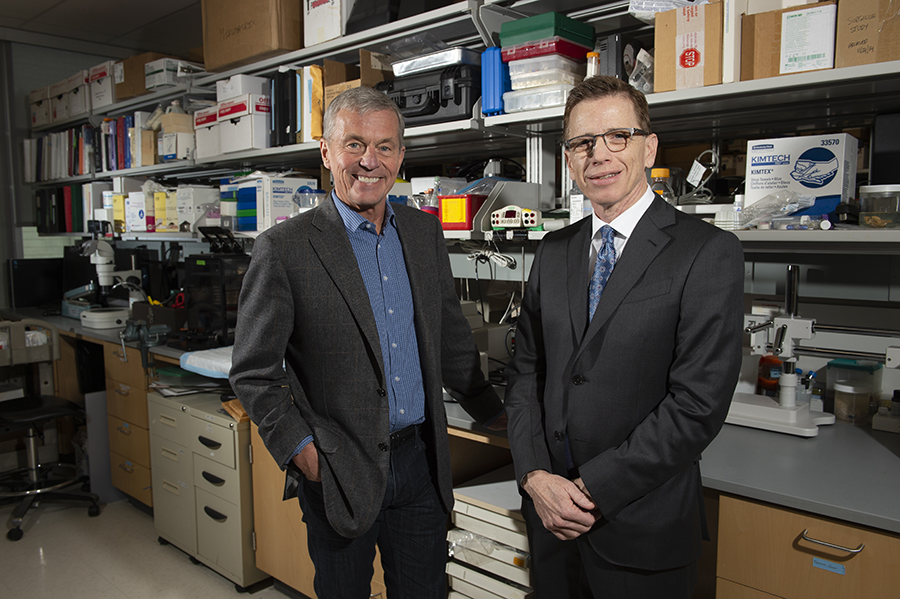OIE Mentor Supports Innovators’ Growth and Potential
Office of Innovation and Entrepreneurship 2025 James “Chip” Hanlon Volunteer Mentor of the Year:... Read more
Office of Innovation and Entrepreneurship 2025 James “Chip” Hanlon Volunteer Mentor of the Year:... Read more
Celebration of Innovation and Entrepreneurship 2025 Regional Business of the Year-- Sarris Candies Sarris Candies, a... Read more
Posted on by Mike Yeomans

Stephen Badylak no longer scrambles to write research grant proposals or hire and mentor new graduate students and postdocs for his academic lab.
But his newly minted professor emeritus status doesn’t mean he is trading his lab coat for golf shorts.
Badylak has stepped full-time into the role for which he has been devoting 20 percent of his time since 2018, when he co-founded a company to license a substantial portion of the massive patent portfolio he had built at the University of Pittsburgh over more than two decades.
That company, ECM Therapeutics, has raised more than $30 million from local Pittsburgh investors and has recently been approved for a clinical trial for the first application of its product, which will be sourced from the proprietary manufacturing facility it has established in Pittsburgh’s northern suburbs.*
Badylak has been one of the university’s most prolific innovators since he arrived in 2003. He is one of the pioneers of the field of extracellular matrix (ECM), a network of proteins, glycoproteins, and polysaccharides that provides structural and biochemical support to surrounding cells in tissues.
He previously served as the deputy director of Pitt’s McGowan Institute of Regenerative Medicine, where he explored the clinical application of ECM-based materials in various forms – powders, sheets, and, more recently, hydrogels – for applications that promote healing in tissues ranging from muscle to nerve, esophagus, and more.
Through the years, innovations from Badylak’s lab have been licensed and formed the basis of numerous products that have impacted the lives of millions of people.
However, he believes the intellectual property licensed to ECM Therapeutics has the potential to far exceed his earlier work, due to more recent advances in technology that promote cell recruitment, differentiation, and repair, and the ability to deliver the material to specific areas of the body in a more targeted and concentrated manner.
Badylak wanted to consolidate the intellectual property he had amassed at Pitt into a single entity, rather than trying to license it piecemeal, which he determined would be inefficient and time-consuming.
That’s when he met the man who could make it happen, Paul Fagan.
Fagan had spent the first half of his career as a tax attorney before partnering with a group of Pittsburgh entrepreneurs to co-found a company to commercialize therapies for hepatitis C. After growing and selling that company, he was semi-retired and kicking tires on potential new opportunities. He met Badylak after being asked to serve on an advisory council for the McGowan Institute.
“When Steve showed me what he had, I was amazed at the range of the IP and the potential therapeutic applications,” he said. “He needed someone to bring the technology to market. I brought a lot of my old management team back from my former company and started ECM Therapeutics.”
Fagan opened his Rolodex of former tax clients and investors in his previous company, most of whom were equally impressed with Badylak’s track record. He also secured his company’s previous office in Pittsburgh’s North Hills to build a lab with clean rooms for the new company, something few biomedical startups do on their own in favor of contract manufacturing. ECM currently employs 14 people.
The first indication the company is pursuing is for anorectal fistulas, a painful, chronic inflammation of the inner lining of the anal canal. The condition primarily affects men, with few good treatment options.
“There is nothing good on the market for this condition, and pharma is interested in licensing,” Fagan said.
He said if ECM’s product can demonstrate safety and efficacy and obtain approval for this first indication, it will generate the cash flow and investor confidence to begin pursuing more indications, which it can either co-develop or license to larger established pharmaceutical companies to bring them to market.
ECM has been approved for a 25-patient preliminary product safety study, which it plans to begin this summer. If successful, it would proceed to a second-phase efficacy trial. Badylak said they should know relatively quickly if the therapy is safe and effective.
Badylak is exploring further applications for the ECM platform to address other unmet clinical needs, including esophageal disease and muscle regeneration. He stated that the Department of Defense previously funded a multi-institutional project focused on treating limb trauma, which was led by his lab.
“We learned so much from that research, and we want to be able to do something for those injured soldiers,” he said.
“Our goal has been to increase value for investors by getting the convincing data for de-risking the technology, as well as demonstrating that we can manufacture in a way acceptable to regulatory agencies,” he said.
With the support of the Pitt Office of Innovation and Entrepreneurship and the regional life sciences ecosystem, he is well on his way to expanding his impact on millions more lives.
* The financial interests Dr. Badylak has in ECM Therapeutics created a conflict of interest concerning some of his University research. This conflict was reviewed and managed by the University.